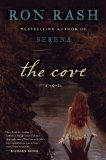Summary | Excerpt | Reading Guide | Reviews | Beyond the Book | Readalikes | Genres & Themes | Author Bio

A Novel
by Ron RashChapter One
At first Laurel thought it was a warbler or thrush, though unlike any she'd heard before - its song more sustained, as if so pure no breath need carry it into the world. Laurel raised her hands from the creek and stood. She remembered the bird Miss Calicut had shown the class. A Carolina Parakeet, Miss Calicut had said, and unfolded a handkerchief to reveal the green body and red and yellow head. Most parakeets live in tropical places like Brazil, Miss Calicut explained, but not this one. She'd let the students pass the bird around the room, telling them to look closely and not forget what it looked like, because soon there'd be none left, not just in these mountains but probably in the whole world.
Sixteen years since then, but Laurel remembered the long tail and thick beak, how the green and red and yellow were so bright they seemed to glow. Most of all she remembered how light the bird felt inside the handkerchief's cool silk, as if even in death retaining the weightlessness of flight. Laurel couldn't remember if Miss Calicut described the parakeet's song, but what she heard now seemed a fitting match, pretty as the parakeets themselves.
As Laurel rinsed the last soap from her wash, the song merged with the water's rhythms and the soothing smell of rose-pink and bee balm. She lifted Hank's army shirt from the pool and went to where the granite outcrop leaned out like a huge anvil. Emerging from the mountain's vast shadows was, as always, like stepping from behind a curtain. She winced from the sunlight, and her bare feet felt the strangeness of treading a surface not aslant. The granite was warm and dry except on the far side where the water flowed, but even there the creek slowed and thinned, as if it too savored the light and was reluctant to enter the cove's darkness.
Laurel laid Hank's shirt near the ledge and stretched out the longer right sleeve first, then the other. She looked around the bedraped granite, her wash like leavings from the stream's recent flooding. Laurel raised her chin and closed her eyes, not to hear the bird but to let the sun immerse her face in a warm waterless bath. The only place in the cove she could do this, because the outcrop wasn't dimmed by ridges and trees. Instead, the granite caught and held the sunlight. Laurel could be warm here even with her feet numbed by the creek water. Hank had built a clothesline in the side yard but she didn't use it, even in winter. Clothes dried quicker in the sunlight and they smelled and felt cleaner, unlike the cove's depths where clothes hung a whole day retained a mildewed dampness.
They'll dry just as quick if I ain't watching, Laurel told herself, and set down the wicker basket. She remembered how Becky Dobbins, a storeowner's daughter, asked why the farmer killed such a pretty bird. Because they'll eat your apples and cherries, Riley Watkins had answered from the back row. Anyway, they're the stupidest things you ever seen, Riley added, and told how his daddy fired into a flock and the unharmed parakeets didn't fly away but kept circling until not one was left alive. Miss Calicut had shaken her head. It's not because they're stupid, Riley.
Laurel followed the creek's ascent, stepping around waterfalls and rocks and felled trees when she had to, otherwise keeping her feet in water and away from any prowling copperhead or satinback. The land steepened and the water blurred white. Oaks and tulip poplars dimmed the sun and rhododendron squeezed the banks tighter. Laurel paused and listened, the bird's call rising over the water's rush. They never desert the flock, Miss Calicut had told them, and Laurel had never known it to be otherwise. On the rarer and rarer occasions the parakeets passed over the cove, they always flew close together. Sometimes they called to one another, a sharp cry of we we we. A cry but not a song, because birds didn't sing while flying. The one time a flock lit in her family's orchard, the parakeets had no chance to sing.
Excerpted from The Cove by Ron Rash. Copyright © 2012 by Ron Rash. Excerpted by permission of Ecco. All rights reserved. No part of this excerpt may be reproduced or reprinted without permission in writing from the publisher.
I find that a great part of the information I have was acquired by looking something up and finding something else ...
Click Here to find out who said this, as well as discovering other famous literary quotes!
Your guide toexceptional books
BookBrowse seeks out and recommends the best in contemporary fiction and nonfiction—books that not only engage and entertain but also deepen our understanding of ourselves and the world around us.